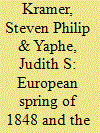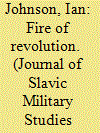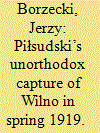| Srl | Item |
| 1 |
ID:
137594


|
|
|
|
|
| Summary/Abstract |
The Arab Spring may be a historical turning point similar to the revolutions that swept Europe in 1848. The latter also began as a seemingly invincible wave demanding democratic reforms but turned into inglorious struggles with uncertain outcomes. They reshaped the map of Europe by replacing multinational empires with the relatively new concept of nationalism as the defining principle of governance. The Arab Spring of 2011 could do the same in the Middle East, where states are still defined according to the imperial principles laid out in World War I secret agreements. If 1848 proves anything, it is that the significance of great revolutionary upheavals emerges long after the barricades have been torn down. The year 1848 was not so much an end as a beginning; it is too early to tell how the Arab Spring will end.
|
|
|
|
|
|
|
|
|
|
|
|
|
|
|
|
| 2 |
ID:
137557


|
|
|
|
|
| Summary/Abstract |
In August, 1920, the fate of Europe hung in the balance. Bolshevik forces stood poised to take Warsaw, while Lenin contemplated the possibility of invading Germany. General von Seeckt in Germany considered renouncing the Treaty of Versailles, thus threatening a new world war. In France and Great Britain, senior leaders reluctantly and with great hesitation discussed military intervention in Eastern Europe. Using primary source material from American, British, German, and Polish archives, this study offers new conclusions about the landscape of post-war Europe through a counterfactual analysis of the Battle of Warsaw.
|
|
|
|
|
|
|
|
|
|
|
|
|
|
|
|
| 3 |
ID:
137556


|
|
|
|
|
| Summary/Abstract |
ontrary to what some authors assert, the idea of ‘liberating’ Wilno from the Soviets did have the support of Polish political and military circles. What evoked reservations was merely Piłsudski’s execution of this idea. His Wilno operation was controversial from a military standpoint and its timing questionable, politically and militarily. It put Poland and its leader at significant risk. While ultimately Piłsudski was vindicated by a brilliant victory, it resulted in no small measure from good fortune.
|
|
|
|
|
|
|
|
|
|
|
|
|
|
|
|